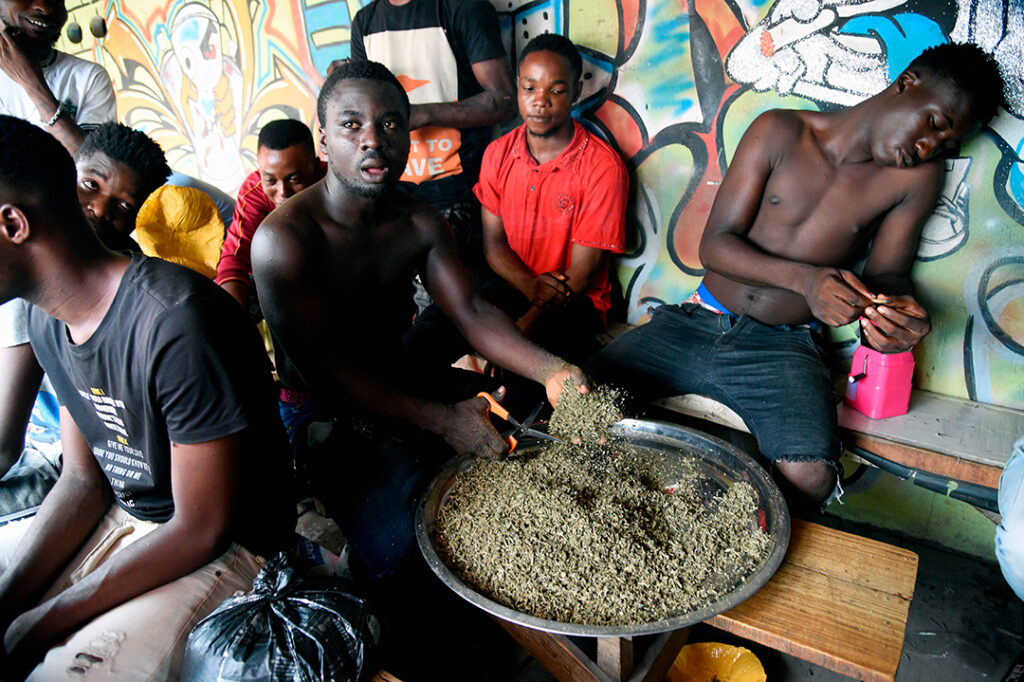ADF STAFF
Ismai’l remembers the day Boko Haram changed his life.
Sitting in the shade outside his displaced family’s makeshift shelter in Maiduguri, the capital of Borno State, he said he turned to drugs to forget.
“I began using drugs after Boko Haram assassinated my two brothers in my presence,” Ismai’l, a pseudonym, told African Arguments. “When I take drugs, nothing matters to me anymore. When anxiety arises, drugs alleviate it.”
Ismai’l’s situation is hardly unique in Maiduguri, the heartland of Boko Haram’s 15-year-old insurgency in northeast Nigeria. He and other drug users are known as “Marlians,” after British-Nigerian singer Azeez Adeshina Fashola, popularly known as Naira Marley, whose music has been criticized as having a negative influence on Nigerian youths by promoting drug abuse and other crimes.
Writing for African Arguments, Imrana Alhaji Buba, a political science researcher at the University of Oslo, said Marlians are known to steal mobile phones, commit rape and engage in armed robbery or “political thuggery.”
In 2016, Aliyu Yusuf escaped a Boko Haram attack in Gwoza, near the Cameroonian border. There was no food to eat one morning at his cramped camp for internally displaced people (IDP) in Madinatu, near Maiduguri, and a man gave him tramadol to reduce hunger pangs.
He felt relief after a few tablets and was quickly addicted.
“I feel very empty without tramadol,” Yusuf told Al Jazeera several years later. “It is the only thing that makes me tough and takes away all my pain away.”
Most tramadol users in Madinatu said they were introduced to it in the IDP camp. Many said they used it due to post-traumatic stress from Boko Haram attacks and the challenges of living in an IDP camp.
In 2016, the drug problem in northeast Nigeria was primarily confined to IDP camps. However, the abrupt closure of Borno’s IDP camps in late 2022 pushed about 200,000 people into greater suffering, according to Human Rights Watch. The problem now effects almost all communities in the central and northern parts of Maiduguri and the Jere Local Government area, Buba wrote.
Citing statistics from the National Drug Law Enforcement Agency (NDLEA), Conflict Resolution Quarterly reported in late 2023 that Nigeria’s drug prevalence rate was 15%, almost triple the global prevalence rate of 5.5%. Drug prevalence rates are the proportion of a population that has used a drug over a particular time period. The prevalence rate of drug abuse among youths was 20% to 40%.
Amphetamines, alcohol, cocaine, diazepam, heroin and tobacco are among the most commonly abused drugs among Nigerian youths. The popularity of cannabis, now packaged in the form of cookies, cakes, sweets and other edible items, is rising.
Nigeria’s Punch newspaper reported that more than 70% of mental health-related cases at the Federal Neuropsychiatric Hospital are drug-related.
In July 2023, Borno State Gov. Babagana Zulum ordered security forces to crack down on a Marlian group accused of committing crimes in Maiduguri and the Jere Local Government area.
“This syndicate specialized not only on phone snatching in broad daylight, robbery and possession of locally made weapons but has now graduated into the killing of innocent lives, including security operatives,” Bulum said in a report by Nigeria’s Daily Trust newspaper.
Conflict Resolution Quarterly’s researchers also noted that rampant insecurity drives drug abuse and wrote that such abuse among Nigerian youths “may have been fueled and escalated by popular hip-hop music and their videos.”
The problem was so bad by last year that Marley partnered with the NDLEA in their campaign against drug abuse.
“I will like to urge my fans, the Marlians, all Nigerian youths, to stop doing drugs because it is not good for your well-being,” Marley said in an NDLEA video. “Let’s all stop substance abuse in every form. I have keyed into this campaign to support NDLEA to stop drugs in the streets. Please join us. It is really not good; it makes you go back into crime.”

